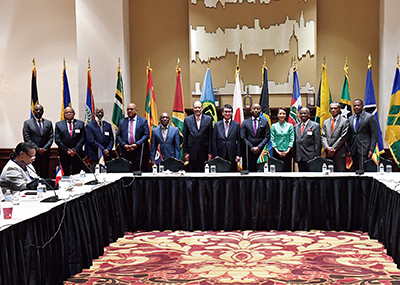Diplomatic Bluebook 2019
Chapter 2
Japan's Foreign Policy that Takes a Panoramic Perspective of the World Map
2 Regional Organizations
Japan is collaborating with regional organizations in the LAC region, where policy coordination on various issues is conducted, such as the Community of Latin American and Caribbean States (CELAC), the Forum for East Asia-Latin America Cooperation (FEALAC), and other organizations below.
(1) Pacific Alliance
The Pacific Alliance (Mexico, Colombia, Peru, and Chile; hereafter referred to as “PA”) aims to conclude a comprehensive free trade agreement with Canada, Australia, New Zealand, and Singapore, and is currently conducting negotiations toward an early conclusion of the agreement. At the summit meeting in July, the Republic of Korea (ROK) and Ecuador expressed interest in participating in the negotiations.
Japan places importance on cooperation with the PA, as it is a group with which it shares fundamental values. In September, Foreign Minister Kono held the Japan-Pacific Alliance Ministerial Meeting in New York, U.S., and it was agreed to consider the method for specific cooperation.
(2) Common Market of the South (MERCOSUR)
MERCOSUR is a customs union composed of Argentina, Brazil, Paraguay, Uruguay, Bolivia1, and Venezuela2. With a few exceptions, tariffs have been eliminated for all goods traded within the region since January 1995.
Japan has held the “Dialogue to Strengthen the Economic Relationship between Mercosur and Japan” a total of four times since 2012, and conducts exchanges of views on recent trade policies and experiences.
- 1 Accession protocol was signed in December 2012. Ratification by each country's congressional assembly is currently underway.
- 2 Membership currently suspended as of December 2018.
(3) Caribbean Community (CARICOM)
CARICOM was founded by 14 Caribbean nations for its economic integration and foreign policy coordination. It shows a big presence in the international arena for their coordinated actions. Although CARICOM countries include many countries with relatively high incomes, they are threatened by natural disasters such as catastrophic hurricanes almost every year, and also have vulnerabilities particular to small island states from the small size of their populations and economies.
Japan is leading its diplomacy in accordance with the three pillars for Japan-CARICOM cooperation ((1) Cooperation toward sustainable development, including overcoming the vulnerabilities particular to small island states; (2) Deepening and expanding fraternal bonds of cooperation and friendship; and (3) Cooperation in addressing challenges of the international community) announced by Prime Minister Abe in 2014. Japan is also providing support to high income level countries based on their development needs and economic capabilities. In addition to holding the Sixth Japan-CARICOM Ministerial-Level Conference in September, Japan also took a number of other opportunities, such as the Japan-Saint Vincent and the Grenadines Summit Meeting in August and the Japan-St. Christopher and Nevis Foreign Ministers' Meeting in November, to further develop its relationship with CARICOM countries in 2018.
 Sixth Japan-CARICOM Ministerial-Level Conference (September 24, New York, U.S.)
Sixth Japan-CARICOM Ministerial-Level Conference (September 24, New York, U.S.)